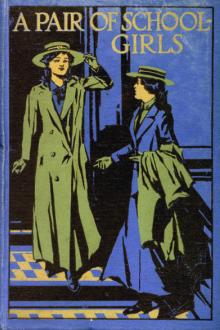The Jolliest School of All by Angela Brazil (top ebook reader .TXT) 📗

- Author: Angela Brazil
Book online «The Jolliest School of All by Angela Brazil (top ebook reader .TXT) 📗». Author Angela Brazil
"It's our own butter and sugar that we saved[241] from breakfast and tea, so please don't blame anybody else."
"I blame myself most," whispered Rachel, as she was left alone.
The immediate result of the incident was a prefects' meeting, at which the head girl, full of compunction, stated the facts of the case to her fellow officers.
"We thought we were doing our duty, but it isn't enough just to act as police," she urged. "Those girls in the Transition were on the right track in getting hold of the juniors, though perhaps they did it in the wrong way. This school isn't really united. We're all divided up into our own sororities, and we're not doing enough for one another. We've got to alter it somehow or confess ourselves failures. Do any of us seniors really know the little ones? I'm sure I don't! Yet we ought to be elder sisters to them! That's the real function of prefects—we're not just assistant-mistresses to help to keep order. Don't you agree?"
Sybil, Erica, Phyllis, and Stella were conscientious girls, and when the matter was thus stated they saw it from Rachel's new point of view. They were ready and willing to talk over plans. They decided, amongst other developments, that with Miss Morley's permission, they would invite the juniors in relays to dormitory teas, in order to win their confidence and establish more friendly relations with them. The Transition were also to be cultivated,[242] and their opinion asked on the subject of term-end festivities and other school affairs about which the prefects had never before deigned to consult them. The altered attitude promised a far more healthy and satisfactory state, and Miss Morley, to whom Rachel hinted some of their reasons for offering hospitality, readily agreed, and allowed the juniors to be entertained with cakes and tea upon the veranda.
"The seniors gave us a simply top-hole time," confided Désirée to Irene afterwards. "We'd cream puffs and almond biscuits and preserved ginger, and we played games for prizes. But don't think we liked it any better than your candy parties. The prefects are awfully kind to us now, but it was you who took us up first! We can't forget that!"[243]
CHAPTER XVII The Anglo-Saxon LeagueThere was an old established custom at the Villa Camellia that on the evening of the last day of March (unless that date happened to fall on a Sunday) the pupils were allowed special license after supper, and, regardless of ordinary rules, might disport themselves as they pleased until bedtime. Irene, who had not yet been present on one of these occasions, heard hints on all sides of coming fun, mingled with mystery. Peachy twice began to tell her something, but was stopped by Delia. Joan and Sheila seemed to be holding perpetual private committee meetings; Elsie spent much time in Jess Cameron's dormitory; and, wonder of wonders, Esther Cartmell was seen walking arm in arm with Mabel Hughes. Though Irene asked many questions from various friends as to the nature of the evening's amusement she could get no certain information. They laughed, evaded direct answers, made allusions to things she did not understand, and whisked away like will-o'-the-wisps. Very much puzzled, and not altogether pleased, she sought her buddy.
"They've all gone mad," she assured Lorna. "I[244] can't get a word of sense out of Peachy; Esther was almost nasty, and Jess shut the door in my face. What's the matter with them? Have I developed spots or a squint? Why have I suddenly become a leper?"
Lorna, who was busy with French translation, shut her dictionary with a bang.
"I've no patience with them," she groused. "It's because you're English. I suppose we shall have to get up a stunt of our own, just out of retaliation, but I'm sick of the whole business."
"What do you mean?"
"Why, it's become a sort of custom to make this a nationality night. The American girls all band together, and so do the South Africans and the Australians; and the Scotch girls are a tremendous clique of their own. They play jokes on every one else, and sometimes it almost gets to fighting."
"Between the sororities?"
"Sororities are forgotten for the time being. Your dearest chum in the Camellia Buds will turn against you if it's a question of Scotch or English, or American or British. I advise you to put away everything you value. The South Africans came into my cubicle last year and smeared my cold cream over my pillow. Of course your bed will be filled with brushes and boots, and any hard oddments they can find lying about. You won't be able to find anything in the morning. The place is an absolute muddle."[245]
"How horrid!"
"Yes, it is horrid. I can't see the fun of it, myself. Practical jokes can go too far, in my opinion, and some of those juniors get so rough they hurt each other. I'd keep out of it only it's wise to stay and defend your own cubicle, or you'd find your blanket hidden and your soap gone."
"Do the seniors join in?"
"No. They barricade themselves in their bedrooms and have some private fun, but they leave us to do as we like. It's the Transition and juniors who play the tricks. Of course, the seniors must know what's going on, because they used to do the same themselves, but they just shut their eyes."
"Oh," said Irene thoughtfully. "And because a thing has always been must it always be? Can't it ever be altered? Are we bound to do nothing but play tricks on the last night of March?"
"It ought to be altered. I've a jolly good mind to go to Rachel and tell her my views about it. She's been much nicer lately than she used to be. Perhaps she'd listen. If she doesn't there'd be no harm done, at any rate. Will you come with me? I don't like going by my little lonesome."
The two girls tapped at the door of dormitory 9, and fortunately found the head prefect within and alone. She received them quite graciously and listened with interest to what Lorna had to say.
"I'm so thankful you've told me," she said in reply. "I agree with you absolutely. It's time this[246] silly business was put a stop to. We prefects have held back because we didn't want to be spoil-sports, but I believe you really voice the opinion of a good many girls. I used to get very tired of it when I was in the Transition myself. If Miss Rodgers found out some of the tricks that are played she'd never let us have the holiday again."
"Can't we persuade them to do something else instead—something really jolly?"
"We must. I'll think about it. Leave it to me. I've been turning it over in my mind for some time, though my ideas never crystallized. I'll have some scheme ready. I can depend on you two to support me in the Transition?"
"Rather!"
Rachel, reporting the interview to her fellow prefects, found them entirely in agreement. They were dissatisfied with many things in the Transition and junior forms, and this Nationality evening was considered the limit. Something seemed to be needed at the present crisis to weld together the various factions of the Villa Camellia, and turn them into one harmonious whole. The prefects were aware that the various sororities were really rival societies, and that, though they might give great fun and enjoyment to their respective members, they were productive of jealousy rather than union.
"We want a common motive," said Rachel. "An inspiration, if possible. I believe some sort of[247] a league would do it. Something outside ourselves, and bigger than just the little world of school. Something that even the smallest juniors could join, and in which girls who have left could still take an interest. It's dawning on me! I believe I've got it! I'm going to call it 'The Anglo-Saxon League.' We'll get everybody to join, and fix its first festival for the 31st of March. It should just take the wind out of those silly nationality tricks. I'll speak to Miss Rodgers and ask her to let us have a parade and dance, with prizes for the best costumes. They'd love that, anyhow. I'll call a meeting in the gym and put it to them. I believe it will catch on."
The pupils at the Villa Camellia were not overdone with public meetings. They responded therefore with alacrity to the notice which Rachel, after obtaining the necessary permission from the authorities, pinned upon the board in the hall. They were all a little curious to know what she wanted to talk to them about. A few anticipated a scolding, but the majority expected some more pleasant announcement.
"Rachel's wrought up, but she doesn't look like jawing us," was the verdict of Peachy, who had passed the head prefect in the corridor. Some of the seniors constituted themselves stewards and arranged the audience to their satisfaction, with juniors on the front benches and the Transition behind. When everybody was seated, Rachel stepped[248] on to the platform and rang the bell for silence. Her cheeks were pink with excitement and there was a little thrill of nervousness in her voice, as if she were forcing herself to a supreme effort, but this passed as she warmed to her subject.
"Girls," she began, "I asked you to come here because I want to have a talk with you about our school life. You'll all agree with me that we love the Villa Camellia. It's a unique school. I don't suppose there's another exactly like it in the whole world. Why it's so peculiar is that we're a set of Anglo-Saxon girls in the midst of a foreign-speaking country. We ourselves are collected from different continents—some are Americans, some English, some from Australia, or New Zealand, or South Africa—but we all talk the same Anglo-Saxon tongue, and we're bound together by the same race traditions. Large schools in England or America take a great pride in their foundation, and they play other schools at games and record their victories. We can't do that here, because there are no foreign teams worth challenging, so we've always had to be our own rivals and have form matches. In a way, it hasn't been altogether good for us. We've got into the bad habit of thinking of the school in sections, instead of as one united whole. I've even heard squabbles among you as to whether California or Cape Colony or New South Wales are the most go-ahead places to live in. Now, instead of scrapping, we ought to be glad to join hands. If[249] you think of it, it's a tremendous advantage to grow up among Anglo-Saxon girls from other countries and hear their views about things. It ought to keep you from being narrow, at any rate. You get fresh ideas and rub your corners off. What I want you particularly to think about, is this: it's the duty of all English-speaking people to cling together. If they've ever had any differences it's time they forgot them. The world seems to be in the melting-pot at present, and there are many strange prophecies about the future. Black and yellow races are increasing and growing so rapidly that they may be ready to brim over their boundaries some day and swamp the white civilizations. Anglo-Saxons ought to be prepared, and to stand hand in hand to help one another. I've been reading some queer things lately. One is that a new continent is slowly rising out of the Pacific Ocean—Lemuria they call it—and some day, hundreds of years hence, there may be land there instead of water, and people living on it. They say too that the center of gravity of both the British Empire and the United States is moving towards the Pacific. Sydney may grow more important than London, and San Francisco than New York when the trade routes make them fresh pivots of energy. Another funny thing I read is that as the world is changing a new race seems to be emerging. Travelers say that the modern children in Australia don't look in the least like English children or French children, or any European nation—they are[250] a fresh type. America has been populated by people from practically all the older countries, but I read that children who are being born there now differ in their head measurements from babies of the older races. Perhaps some of you may be interested in this and some of you may only be bored, but what I want to rub in is that if a new, and perhaps superior, race is evolving it's surely part of





Comments (0)